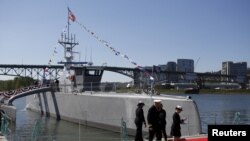The U.S. military introduced a warship on Thursday that can direct itself and be used to hunt enemy submarines.
The American technology is a major upgrade in robotic warfare against Chinese and Russian navies.
The 40-meter-long vessel is named Sea Hunter. Sea Hunter does not carry weapons. It is powered by two diesel engines. The ship reaches speeds of 27 knots.
It can sail on the ocean's surface for two or three months — without a crew onboard to control it.
The ship is very efficient. It operates at a fraction of the cost of the Navy's manned ships.
“This is the first time we've ever had a totally robotic, trans-oceanic-capable ship,” said Deputy U.S. Defense Secretary Robert Work. He added that he hoped such ships might be operating in the Western Pacific within five years.
Sea Hunter arrives during a time of high tension in the western Pacific and the South China Sea.
China is expanding its submarine fleet. U.S. aircraft carriers, submarines and unmanned warships are critical to America's military power in the western Pacific.
"We're not working on anti-submarine [technology] just because we think it's cool,” said Peter Singer, an expert on robotic warfare. “We're working on it because we're deeply concerned about the advancements that China and Russia are making.”
The U.S. military says it hopes Sea Hunter, once it is tested at sea, could head to the U.S. Navy's Japan-based 7th Fleet to continue testing.
The ship's projected daily operating cost is less expensive than if it were staffed with a crew. The daily operating cost is $15,000 to $20,000. The Navy said $20 million went into building Sea Hunter.
"You now have an asset at a fraction of the cost of a manned platform," said Rear Admiral Robert Girrier, the Navy's director of unmanned warfare systems.
The ship is about to undergo two years of testing at sea. Test runs will confirm if Sea Hunter can use radar and cameras to avoid other vessels. The tests include exercises to check that it can follow rules and standards for operating.
During the christening ceremony in Portland, Oregon, Work raised the possibility of positioning weapons on Sea Hunter.
He stressed that even if the United States decided to put weapons on robotic vessels such as Sea Hunter, any decision to use offensive lethal force would be made by humans.
“There's no reason to be afraid of a ship like this,” Work told reporters at the ceremony.
I’m Bryan Lynn.
Jim Dresbach adapted this story for Learning English and VOANews.com. Kathleen Struck was the editor.
We want to hear from you. Write to us in the Comments Section or visit our Facebook page.
________________________________________________________________
Words in This Story
upgrade – n. to make something better by including the most recent information or improvements
diesel – n. a type of engine that uses diesel fuel rather than gasoline and that is used especially in large vehicles
aircraft carrier – n. a military ship that has a large deck where aircraft take off and land
christening – n. the official ceremony in which something, such as a ship, is named





